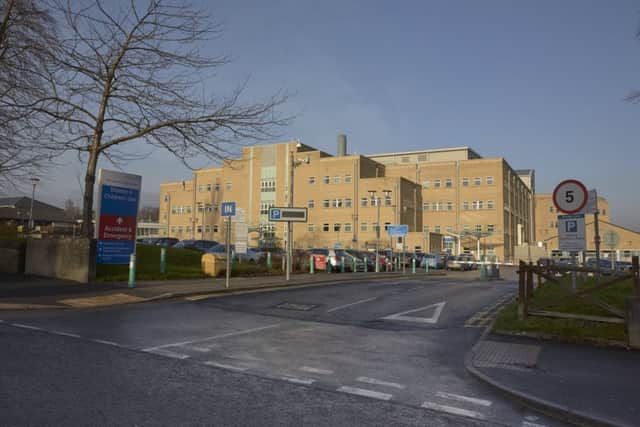Thousands of operations cancelled at Calderdale Royal Hospital over the last four years


Over the last four years, 5,418 operations were cancelled, at least 2,147 of which were at the last minute, an average of 3.7 per day, or 26 per week.
Last-minute cancellations are those that take place on the day the operation is scheduled, including after the patient has arrived at hospital.
Advertisement
Hide AdAdvertisement
Hide AdAccording to figures released under the Freedom of Information Act, the biggest reason for a cancellation was a patient being unfit for surgery and cancelling the operations themselves, which happened 651 times.


Patients being unfit with an acute illness accounted for 611 cancellations, while the number of operations overrunning led to 610 cancellations.
Emergencies accounted for 574 operations being cancelled, while 445 had to be cancelled due to the patient not turning up.
Natalie Ratcliffe, regional organiser for Unison, said: “The figures are sobering though not surprising, lists over running have particular impacts on staff such as finishing late and not having enough staff to cover planned operations.
Advertisement
Hide AdAdvertisement
Hide Ad“Cancellations will put extra pressure on an already declining workforce. Staffing is a major issue across the Trust.


“Another worrying aspect is the potential reconfiguration of the Trust. Part of their plan would be to streamline the workforce. This would absolutely have a detrimental impact on the workforce.”
The director of policy and strategy at NHS Providers, Miriam Deakin, said: “NHS trusts want to meet their commitments to carry out routine and planned operations for patients. Although cancellations are a last resort, when services are extremely busy trusts do sometimes have to focus first on the patients that need help most urgently.
“An increase in cancellations is a symptom of the pressure on a health and care system. Despite a sustained funding squeeze and growing workforce shortages, trusts are caring for more people, who are often frail or have multiple conditions.
Advertisement
Hide AdAdvertisement
Hide Ad“Cancelled operations are a problem for patients, and a sign of the pressures facing the NHS and its staff.”


Professor Cliff Shearman, Vice President of the Royal College of Surgeons, said: “Based on waiting time figures we understand the Trust performs over 20,000 operations a year. For those patients affected, a cancelled operation may have caused great anxiety. It can be stressful and inconvenient for patients, and their families, to prepare for surgery, only to be told it cannot go ahead.
“The Trust gives a wide range of reasons for cancellations, which suggests that there wasn’t a specific perpetual cause, such as a lack of facilities. In fact, the most common explanation was patients being unfit for surgery and that’s both unavoidable, in most cases, and a legitimate reason for cancelling surgery.
“Generally, the most concerning reasons for cancelled operations are a lack of facilities, such as beds, or personnel including surgeons and anaesthetists. However, at this trust the number of cancellations due to these reasons are very low.”
Advertisement
Hide AdAdvertisement
Hide AdCalderdale and Huddersfield NHS Trust’s Chief Operating Officer, Helen Barker, said: “Our Trust performs over 40,000 routine and acute operations a year and sometimes, with regret, we have to cancel these.


“Only a small proportion are cancelled for hospital reasons and we are grateful to our clinical teams who work hard to ensure beds and theatres are available on the majority of occasions.
“When this does happen we always try to reschedule them as soon as possible but at a time that is convenient to the patient.
“A larger percentage of our cancellations are through patient choice or being too unwell.
Advertisement
Hide AdAdvertisement
Hide Ad“We have invested in a pre-assessment service to help minimise these as can be seen by the year on year improvement and also have a list of patients who are willing to attend at short notice to ensure we don’t waste this precious capacity.”
The yearly figures for cancellations
2015 - 1,479
2016 - 1,431
2017 - 1,361
2018 - 1,147
The reasons for cancellations
unfit for surgery (patient cancel) - 651
unfit with acute illness - 611
list overrun - 610
emergencies/trauma - 574
did not attend - 445
operation not necessary (hospital cancel) - 330
pre-existing medical condition - 299
appointment inconvenient - 294
operation not wanted (patient cancel) - 285
ward beds unavailable - 277
administrative error - 206
surgeon unavailable - 202
needs further investigations - 190
equipment failure/unavailable - 168
pre-op guidance not followed - 132
unsuitable day for surgery - 60
anesthetist unavailable - 43
theatre staff unavailable - 17
procedure done elsewhere in Trust - 15
ICU/HDU beds unavailable - 9